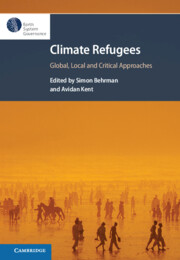Book contents
- Climate Refugees
- Series page
- Climate Refugees
- Copyright page
- Contents
- Contributors
- Acknowledgements
- 1 An Alternative Introduction: An Interview with the Editors, Which Never Took Place
- Part I Global Governance
- Part II International Law
- Part III Regional and Local Perspectives and Solutions
- Part IV Critical Approaches
- 16 Environmental Justice and Climate-Induced Migration
- 17 Coping with Climate Change: A Critical Review of the Link between the Human Rights System and Climate Displacement
- 18 The IOM as a ‘UN-Related’ Organisation, and the Potential Consequences for People Displaced by Climate Change
- 19 Climate Refugees: Is Litigation an Effective Strategy?
- Index
18 - The IOM as a ‘UN-Related’ Organisation, and the Potential Consequences for People Displaced by Climate Change
from Part IV - Critical Approaches
Published online by Cambridge University Press: 01 April 2022
- Climate Refugees
- Series page
- Climate Refugees
- Copyright page
- Contents
- Contributors
- Acknowledgements
- 1 An Alternative Introduction: An Interview with the Editors, Which Never Took Place
- Part I Global Governance
- Part II International Law
- Part III Regional and Local Perspectives and Solutions
- Part IV Critical Approaches
- 16 Environmental Justice and Climate-Induced Migration
- 17 Coping with Climate Change: A Critical Review of the Link between the Human Rights System and Climate Displacement
- 18 The IOM as a ‘UN-Related’ Organisation, and the Potential Consequences for People Displaced by Climate Change
- 19 Climate Refugees: Is Litigation an Effective Strategy?
- Index
Summary
The conclusion of a relationship agreement between the IOM and the UN in 2016, alongside the organisation’s rebranding to ‘UN Migration’, gave the appearance of a significant shift in a normative direction, but was it? And what are the implications for people displaced by climate change? The IOM has never been a UN agency. In fact, characteristic features of the IOM that set it apart from the UN are preserved in the 2016 Agreement, including the express retention and acknowledgement of its institutional independence. Moreover, the UN and the IOM are oriented to achieve quite different goals. Whereas the mandate of the UN is normative and protective, fundamentally concerned with upholding human rights, the constitutional mandate of the IOM is ‘to make arrangements for the organized transfer of migrants’ and to provide various migration services ‘at the request of and in agreement with the States concerned’. Accordingly, the IOM’s adoption of the UN name and logo could be misleading.
Keywords
- Type
- Chapter
- Information
- Climate RefugeesGlobal, Local and Critical Approaches, pp. 338 - 356Publisher: Cambridge University PressPrint publication year: 2022
- 1
- Cited by

